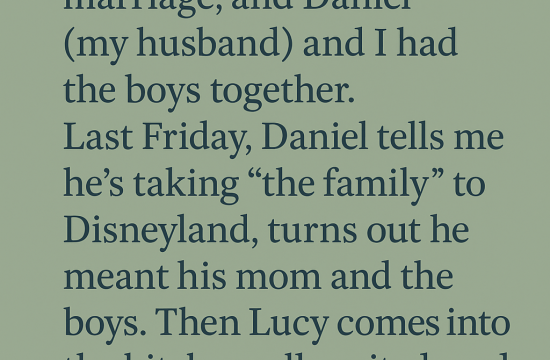A woman who had spent three years being quietly excluded from her in-laws’ family activities finally reached her breaking point one night. But when her husband’s reaction to her taking a stand turned bitter, she was left questioning whether she had gone too far—or if she had simply uncovered the truth no one wanted her to see.
A 32-year-old Reddit user shared how her 35-year-old husband’s family held regular monthly dinners. While her brothers-in-law’s fiancées and girlfriends were always invited, she was told to “sit this one out” about half the time. Each time, her husband insisted it was “just family business” and that she didn’t need to be there.
At first, she tried to brush it off. But the repeated exclusions gnawed at her, especially because she had never been given a reason. She loved her husband, but she couldn’t shake the question: why was she treated differently from everyone else’s partners?
Finally, one evening, after once again being told to stay home, she decided she had had enough. She made a reservation at the very same restaurant her husband’s family was dining at. Arriving fifteen minutes after her husband left, she quietly slipped inside, ordered a meal for herself, and waited for the right moment.
Eventually, she walked past their table on her way to the bathroom. Her husband froze, shocked to see her. His mother’s face twisted in disdain. When they confronted her, she calmly explained that she wasn’t there to join them—she simply wanted a steak. She then returned to her own table, finishing her meal in silence, while her husband and in-laws simmered with discomfort.
But the fallout at home was explosive. Her husband accused her of being disrespectful and humiliating him. He called her names. She pushed back, reminding him that his brothers’ partners were never excluded and that she had every right to be treated equally.
The next day, emboldened by support from Reddit commenters, she confronted him again. This time, she demanded the truth. At first, he claimed it was a “family decision.” But when she pressed harder, pointing out that she was his family, he finally admitted the real reason: she “didn’t fit in.”
Her heart sank. “Is it because I’m half-Black?” she asked. He denied it—at first. But his hesitation gave him away. Eventually, he confessed that his mother had never approved of her. It wasn’t just her race—though that was part of it—it was also her personality, her political views, and even the fact that she had once spent Christmas with her own family instead of theirs. From the beginning, her mother-in-law had pressured him to “find someone more like him.”
Even after their marriage, his mother schemed to keep them apart, pushing him to spend time away from her.
Horrified, but now vindicated, the woman realized she had uncovered the ugly truth: she wasn’t excluded because of who she was as a wife, but because of prejudice she could never change.
That night, she asked her husband a final question: “Do you also want space from me?” Without waiting for his answer, she went into the bedroom, packed her bags, and left for her sister’s house.
From there, she updated her post, admitting she hadn’t contacted her husband since leaving. She believed divorce or separation was likely, but for the first time, she felt a measure of clarity.
Readers flooded her with support. One warned her to imagine raising children under the thumb of such a mother-in-law. Another praised her bravery, saying leaving was the best thing she could do, because her husband would likely have caved to his mother eventually—whether through infidelity or abandonment. Others urged her to tell her sisters-in-law the truth about what kind of family they were marrying into.
For the first time in years, she felt seen, validated, and strong.
What would you have done in her place? Was she wrong for showing up at the restaurant—or was it the only way to expose the truth?











